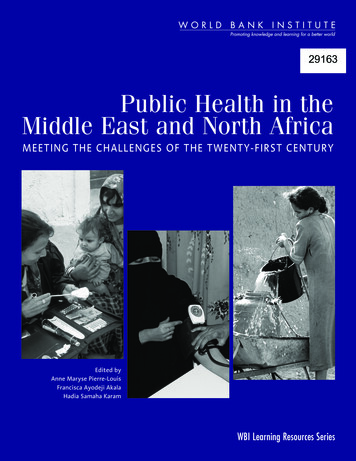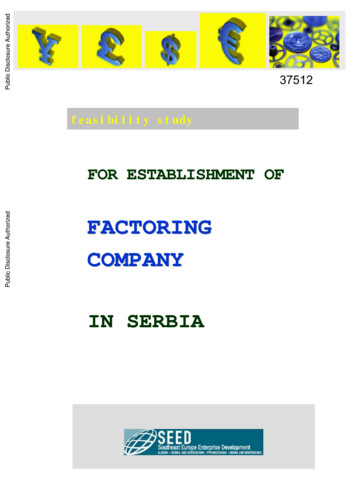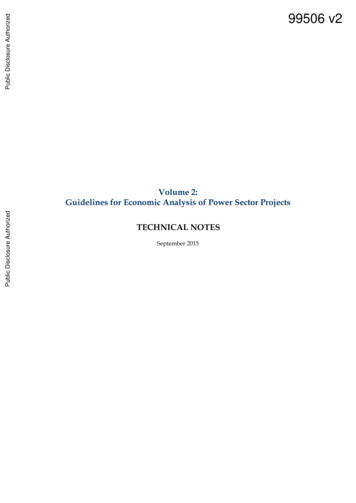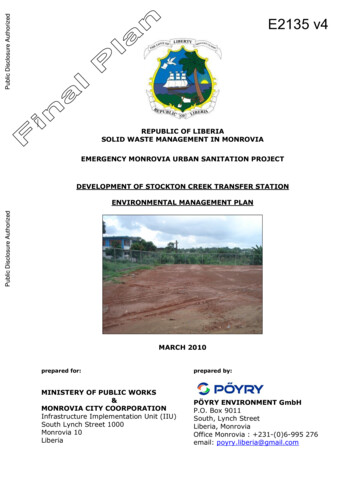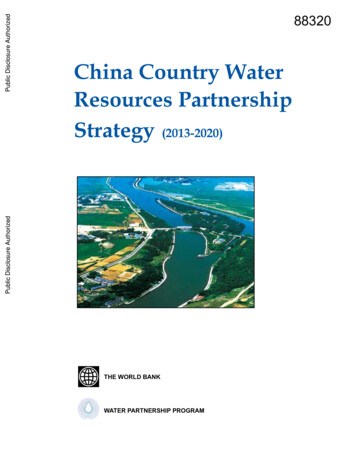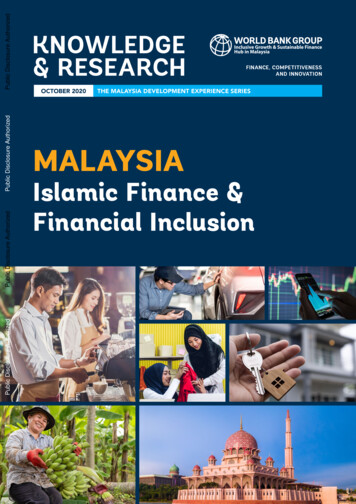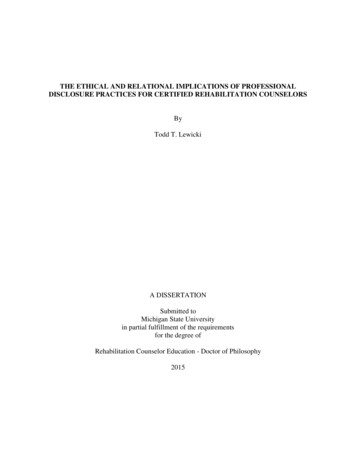
Transcription
Public Disclosure AuthorizedPublic Disclosure AuthorizedPublic Disclosure AuthorizedPublic Disclosure AuthorizedcgiarNews- December 2007http://www.cgiar.org/enews/december2007/ (1 of 2)05/14/2008 10:59:27 AM43848December 2007Report on AGM07: A Changing CGIAR for a Changing WorldFar-reaching change was a central theme of the CGIAR’s 2007 Annual GeneralMeeting (AGM07), held in Beijing on December 3-6. The meeting was hosted by thegovernment of the People’s Republic of China and organized jointly with the ChineseAcademy of Agricultural Sciences (CAAS).China and the CGIAR: Strengthening the PartnershipAGM07 offered the CGIAR and its Chinese partners a valuable opportunity to reviewshared progress and achievements and to continue strengthening collaboration.Rising Food Prices: An Ominous Threat to the World's PoorIncome growth, climate change, high energy prices, globalization and urbanizationare all converging to transform food production, markets and consumption, accordingto a report from the International Food Policy Research Institute (IFPRI).Science Forum 2007: Harnessing Scientific Advances for SustainableAgricultureThe ability of the CGIAR to successfully confront the formidable combination ofchallenges outlined in various presentations at AGM07 will depend in large part on itsability to mobilize advanced science in collaboration with numerous partners.The African Women in Agricultural Research and Development (AWARD)ProgramConfronting the disparity between the role of African women in farming and theirlimited presence in the agricultural sciences, the CGIAR Gender & Diversity Programwill embark on an unprecedented US 13 million initiative to help advance the careersof at least 360 African women scientists.CGIAR Science Awards: Recognizing Excellence in Research for SustainableDevelopmentSix awards were conferred on outstanding scientists and research teams at AGM07ina ceremony held at the magnificent Great Hall of the People in Beijing.Communications Awards: Extending the Reach of Research ResultsIn addition to bringing recognition to outstanding scientists and research teams,AGM07 called attention to the talents of communications professionals who haveexcelled in conveying science-based knowledge to the public.Crawford Lecture: Retrofitting Civilization for Climate ChangeThe 2007 Sir John Crawford Memorial Lecture was presented in an extraordinarysetting at the Great Hall of the People in Beijing by theoretical neurobiologist Dr.William Calvin, Affiliate Professor of Psychiatry and Behavior Sciences at theUniversity of Washington School of Medicine in Seattle.
cgiarNews- December 2007Centers' and Members' Day: Focused on Change in the CGIARContinuing reform within the CGIAR was the central focus of a presentation, followedby commentary and extensive discussion in the opening session of Centers’ andMembers’ Day.Portraits of Impact of Agricultural ScienceOver one hundred entries were submitted to the CGIAR Photo Competition of 2007.AGM07 Photo GalleriesVisit AGM07 online photos galleries.http://www.cgiar.org/enews/december2007/ (2 of 2)05/14/2008 10:59:27 AM
cgiarNewsDecember 2007Message from the Chair and DirectorDear Colleagues:Report on AGM07: AChanging CGIAR for aChanging WorldChina and the CGIAR:Strengthening the PartnershipRising Food Prices: AnOminous Threat to theWorld's PoorScience Forum: HarnessingScientific Advances forSustainable AgricultureThe African Women inAgricultural Research andDevelopment (AWARD)ProgramCGIAR Science Awards:Recognizing Excellence inResearch for SustainableDevelopmentCommunications Awards:Extending the Reach ofResearch ResultsCrawford Lecture:Retrofitting Civilization forClimate ChangeCenters' and Members' Day:Focused on Change in theCGIARPortraits of Impact ofAgricultural SciencePhoto GalleriesThe 2007 Annual General Meeting, hosted by the government of the People’sRepublic of China and attracting more than 800 participants, will most likely beremembered as a landmark occasion for the CGIAR and its stakeholders.Practically every session and presentation conveyed a sense of urgency aboutchanging conditions that are rapidly redefining agriculture and raising serious newconcerns about the future well-being of rural people and urban consumers. But ourdiscussions also reflected the CGIAR’s determination, with the support of Membersand other stakeholders, to rise to new challenges, particularly global climate changeand increasingly volatile grain markets.Many of our discussions centered on the Facilitated Change Management Processbegun earlier this year. This inclusive process, together with the upcoming ExternalReview, represent valuable opportunities – ones we simply cannot afford to waste –for better preparing the CGIAR to help cope with a highly uncertain outlook foragriculture.In this issue of e-CGIAR News, we are pleased to present a series of articlesdescribing how AGM07 addressed the new world food situation that is emergingaround us and how the diverse talents and capacities of CGIAR-supported scientistsare being brought to bear on this and other challenges.Clearly, robust partnerships are a key requirement for the success of our efforts.That’s why it was especially fitting for us to organize AGM07 jointly with a majorAsian partner, the Chinese Academy of Agricultural Sciences (CAAS). Ourcollaboration with institutions in this country has grown steadily in recent years, andthis meeting marked the beginning of new efforts to broaden and strengthen ourpartnerships.Another central prerequisite for dealing effectively with the new world of agriculture– as described in the recently launched World Development Report: Agriculture forDevelopment – is creative and practical application of advanced science. For thatreason, AGM07 featured a day-long Science Forum, which brought together CGIARresearchers, Members and other stakeholders. Participants identified a wide range ofopportunities as well as concrete measures to better mobilize science from withinand outside the CGIAR.In closing, we wish you all the best for the holiday season and for the coming year. Itpromises to bring exciting new developments in our shared endeavor to makescience-based solutions work for the poor.Cordially,Katherine SierraRen WangCGIAR ChairCGIAR ssage chair.html (1 of 2)05/14/2008 10:59:47 AM
cgiarNewsDecember 2007AnnouncementsAwardsReport on AGM07: AChanging CGIAR for aChanging WorldChina and the CGIAR:Strengthening the PartnershipRising Food Prices: AnOminous Threat to theWorld's PoorScience Forum: HarnessingScientific Advances forSustainable AgricultureThe African Women inAgricultural Research andDevelopment (AWARD)ProgramCGIAR Science Awards:Recognizing Excellence inResearch for SustainableDevelopmentCommunications Awards:Extending the Reach ofResearch ResultsCrawford Lecture:Retrofitting Civilization forClimate ChangeCenters' and Members' Day:Focused on Change in theCGIARCGIAR scientists were honored with several major awards recently, highlighting theCGIAR’s reputation for scientific excellence in the world's major agricultural scientificfora. The awardees include:Achim Dobermann , of IRRI, received the Werner Nelson Award for Diagnosis ofYield -Limiting Factors.Braima James of IITA was elected Fellow of the Royal Entomological Society, UK.He joins an eminent group of Fellows of the Society which includes Darwin andWallace to mention but two. James is Coordinator of the CGIAR Systemwide Programon Integrated Pest Management and is Officer-in-Charge of the IITA Benin Station.David J. Mackill , Head of IRRI’s Plant Breeding, Genetics, and BiotechnolgyDivision, was made Fellow of the American Society of Agronomy.Jorge Franco , José Crossa, Marilyn Warburton, and Suketoshi Taba, allCIMMYT scientists, were awarded the Crop Science C8 Outstanding Paper Award bythe Crop Science Journal for their paper “Sampling strategies for conserving maizediversity when forming core subsets using genetic markers.” Working with a smallernumber of accessions facilitates breeding, testing, and germplasm bank use.M.V.K. Sivakumar , formerly of ICRISAT and currently with WMO, was given theInternational Service in Agronomy Award.Ravi Singh , CIMMYT Principal Scientist, was elected Fellow of the American Societyof Agronomy at the Society’s 2007 Annual Meeting. He was also recently awardedthe International Service in Crop Science Award for his ongoing contributions todevelop rust-resistant wheat. Singh has developed some of the highest-yielding andwidely adapted CIMMYT-spring wheat germplasm that also features high levels ofdurable resistance to both leaf and yellow rusts.Roland Buresh , IRRI Senior Scientist, and John Ryan of ICARDA received theInternational Soil Science Award and the Soil Science Distinguished Service Award,respectively from the Soil Science Society of America.Portraits of Impact ofAgricultural SciencePhoto nnouncements.html05/14/2008 11:00:04 AM
cgiarNewsDecember 2007AGM07: A Changing CGIAR for a Changing WorldReport on AGM07: AChanging CGIAR for aChanging WorldChina and the CGIAR:Strengthening the PartnershipRising Food Prices: AnOminous Threat to theWorld's PoorScience Forum: HarnessingScientific Advances forSustainable AgricultureThe African Women inAgricultural Research andDevelopment (AWARD)ProgramFar-reaching change was a central theme of the CGIAR’s 2007 Annual GeneralMeeting (AGM07), held in Beijing on December 3-6. The meeting was hosted by thegovernment of the People’s Republic of China and organized jointly with the ChineseAcademy of Agricultural Sciences (CAAS). More than 800 CGIAR stakeholdersattended.Centers’ and Members’ DayOngoing reforms within the CGIAR, against the background of profound changes inworld agriculture, were the focus of a plenary presentation on Centers’ and Members’Day, made on behalf of the Alliance of the CGIAR Centers by Emile Frison, whochairs the Alliance Executive.Opening CeremonyThe AGM07 Opening Ceremony also drew attention to the ominous and uncertainoutlook for agriculture that is rapidly unfolding and to the need for more vigorousefforts to thwart negative impacts on the world’s poor.CGIAR Science Awards:Recognizing Excellence inResearch for SustainableDevelopmentCommunications Awards:Extending the Reach ofResearch ResultsCrawford Lecture:Retrofitting Civilization forClimate ChangeCenters' and Members' Day:Focused on Change in theCGIARPortraits of Impact ofAgricultural SciencePhoto GalleriesBecause of the sheer size of China’s economy and agriculture and because of itsvaluable experience in managing policy, institutional and technological change, thiscountry’s response to the new outlook for agriculture will figure importantly in thedeveloping world. A message from China’s Vice Premier Hui Liangyu, calling attentionto the importance of technological advances, was delivered by Niu Dun, Vice Ministerof Agriculture.CGIAR Chair Katherine Sierra (photo above), in her opening speech, underlined thehttp://www.cgiar.org/enews/december2007/story 01.html (1 of 3)05/14/2008 11:00:28 AM
cgiarNewsvalue of the Centers’ research partnerships with China and welcomed the opportunityto review with Chinese colleagues and other stakeholders shared progress andachievements in agricultural development.As an aid to this process, the CGIAR Secretariat worked with the Marketing Group toprepare for distribution at AGM07 a book entitled China: Voices for SustainableAgriculture. It presents a rich collection of stories describing the results and benefitsof collaboration between CGIAR Centers and their Chinese partners.Sierra also stressed the need to agree on steps that will greatly strengthen theCGIAR’s response to the challenge of climate change. “Next week at the 13 th UNClimate Change Conference in Bali, Indonesia,” she said, “I will offer delegates anoverview of research already under way in the CGIAR Centers that is critical forhelping cope with climate change. I hope to share with them as well the outcomes ofour discussions on steps to greatly intensify this work.”During the AGM07 business meeting, many CGIAR Members expressed strongsupport for announcing this initiative at the Climate Change Conference in Bali, andsome promised to convey this support to their delegations taking part in theconference. They also offered valuable advice about how the CGIAR should proceedin amplifying its climate change work, particularly in relation to the initiatives ofother organizations.In closing, Sierra urged stakeholders to take full advantage of the Facilitated ChangeManagement Process under way since mid-2007 to formulate a new vision for theCGIAR and to identify concrete steps for realizing that vision. “Our partners expectnothing less than a more effective CGIAR – one that inspires them with hope andprovides them with the means of coping with an uncertain, but manageable, futurefor agriculture.”CGIAR Director Ren Wang further reinforced this message in his update, calling onmeeting participants to focus on finding ways of better positioning the CGIAR toconfront new challenges. He signaled the importance of giving partnership, capacitystrengthening and constructive alignment between Centers a prominent place in arevitalized CGIAR.Sierra concluded the Opening Ceremony with an announcement that the Bill &Melinda Gates Foundation will fund a US 13 million initiative of the CGIAR Gender &Diversity Programme, aimed at significantly expanding the role of African women inthe agricultural sciences. Through mentoring and related support, the new initiative –called the African Women in Agricultural Development (AWARD) Program – will bringwomen’s capacities more fully to bear on the task of transforming Africa’sagricultural production.The announcement was followed by the screening of a deeply moving video recentlydeveloped by the Gender & Diversity Program, which should help inspirecommitment to the important cause of the AWARD Program.Science ForumThe stakeholder meeting at AGM07 was once again organized as a Science Forum.The event was designed to draw lessons learned and other implications from majorscientific achievements of recent years, to examine new developments in variousareas of advanced science and to determine how the CGIAR can further incorporatethis science into its work for China and other developing countries.The forum’s opening session included four major presentations. These served toplace the group discussions to follow within the framework of emerging trends inseveral key spheres: the world food situation, insights from 25 years of agriculturaldevelopment in developing countries, important advances in China’s agriculturalproduction specifically and new perspectives and approaches from advanced science.Next, came three groups of more than a dozen parallel sessions dealing withscientific progress and opportunities both globally and in specific regions of thedeveloping world.After the Science Forum, theoretical neurobiologist William Calvin delivered the SirJohn Crawford Memorial Lecture, a perennial highlight of the CGIAR annual meeting,at the Great Hall of the People. Entitled “The Great Use-It-or-Lose-It IntelligenceTest,” the lecture argued for greater political will and urgent action on many fronts,including agriculture, aimed at “retro-fitting” human civilization within the next 10years to forestall truly catastrophic effects of climate change.The lecture was followed by the CGIAR Science Awards ceremony, in whichoutstanding individuals and teams were recognized for work that demonstrates howscience can benefit poor farmers and consumers.Throughout AGM07, a science exhibition – the largest ever at an AGM – was open tothe public, showcasing the work of the CGIAR Centers, Chinese agricultural ory 01.html (2 of 3)05/14/2008 11:00:28 AM
cgiarNewsinstitutions and other partner organizations.Highlights of the 2-day Business Meeting, with emphasis on decisions about majorissues, were as follows:Change Management Process: The CGIAR expressed strong support for movingforward with the change management process, and it endorsed the Scoping Team’sproposal for phase 2 of the process. There was a sense of enthusiasm and urgencyabout moving forward and taking advantage of the momentum created so far.Funding Priority Research: The CGIAR endorsed the recommendation of theCGIAR Executive Council (ExCo) Ad Hoc Committee on Funding System Priorities,and it agreed to establish an ExCo Ad Hoc Committee to examine finance andfunding matters in the CGIAR.Independent Review of the CGIAR: The inception report of the panel wasendorsed, with requests to have stronger emphasis on partnerships and to ensurethat views are sought from Members and national agricultural research systems inthe South. The CGIAR also expressed a need for the review to be more sharplyfocused and to be firm on time-deadlines, so as not to delay the change process andso that the review can contribute in a timely manner to the change process.CGIAR Strategic Initiative on Climate Change: The CGIAR endorsed the Chair’sproposal to call on the international community at the 13 th UN Climate ChangeConference in Bali, Indonesia, to support the CGIAR’s efforts to intensify climatechange research and substantially increase resources dedicated to this vital work.CGIAR Handling of External Program and Management Reviews: The CGIARagreed to delegate responsibility for making decisions about External Reviews ofCenters and Challenge Programs to ExCo to free up more time for strategicdiscussions at AGMs.http://www.cgiar.org/enews/december2007/story 01.html (3 of 3)05/14/2008 11:00:28 AM
cgiarNewsDecember 2007China and the CGIAR: Strengthening thePartnershipReport on AGM07: AChanging CGIAR for aChanging WorldChina and the CGIAR:Strengthening the PartnershipRising Food Prices: AnOminous Threat to theWorld's PoorScience Forum: HarnessingScientific Advances forSustainable AgricultureThe African Women inAgricultural Research andDevelopment (AWARD)ProgramCGIAR Science Awards:Recognizing Excellence inResearch for SustainableDevelopmentCommunications Awards:Extending the Reach ofResearch ResultsCrawford Lecture:Retrofitting Civilization forClimate ChangeCenters' and Members' Day:Focused on Change in theCGIARPortraits of Impact ofAgricultural SciencePhoto GalleriesAGM07 offered the CGIAR and its Chinese partners a valuable opportunity to reviewshared progress and achievements and to continue strengthening collaboration.Agricultural scientists in China began working with the international Centers evenbefore the CGIAR’s establishment in 1971. Since officially joining the CGIAR in 1984,China has provided influential leadership, and its counsel is held in high regard.Participation and partnershipThe CGIAR’s main point of contact in China is the Chinese Academy of AgriculturalSciences (CAAS), the research arm of China’s Ministry of Agriculture.The current CGIAR Director, Ren Wang, was a Vice President of CAAS and theDeputy Director of Research at the International Rice Research Institute (IRRI) priorto taking up his current appointment. The CGIAR also works with the ChineseAcademy of Science (CAS), the Chinese Academy of Engineering, the ChineseAcademy of Forestry and the Chinese Academy of Fisheries.Four Chinese experts have served on the Boards of Trustees of as many CGIARsupported Centers: the International Potato Center (CIP), International Food PolicyResearch Institute (IFPRI), IRRI and the WorldFish Center.Chinese scientists that have served on CGIAR Center Boards include Dr. Song Jian,former State Councillor and Vice Chairman of the National People’s PoliticalConsultative Council. He was a member of the IRRI Board for 6 years and currentlyserves on the CIP Board. China has been represented in the CGIAR Executive Councilas well and thus contributed importantly to the recent CGIAR reform program.Since China joined the CGIAR, eleven CGIAR Centers have undertaken cooperativeactivities with Chinese partners. Seven Centers maintain offices in China: BioversityInternational, the International Maize and Wheat Improvement Center (CIMMYT),CIP, IFPRI, the International Livestock Research Institute (ILRI), IRRI and theWorldFish Center.More than 50 Chinese institutions have formed partnerships with CGIAR Centers.Center scientists and their Chinese partners have co-operated in 70 completed andcontinuing projects. Major priority areas of collaboration have been geneticresources, crop and animal breeding, biotechnology (including biosafety), plantprotection, natural resource management, policy research and food quality research.In support of their Chinese partners, the CGIAR Centers have provided advancedtraining to more than 4,000 of the country’s scientists, many of whom now holdleadership positions in China’s agricultural research system or in internationalorganizations. The country has been active in other knowledge-sharing efforts aswell, hosting more than 40 international conferences and workshops, includingforums dedicated to strengthening and sharpening the focus of the China-CGIARrelationship.Collaborative research and its resultsChina is among the world’s largest producers of major crops on which the CGIARCenters conduct research – notably rice, wheat, maize, potato and sweet potato.Collaborative international research on crops began in China during 1970, when IRRIprovided lines from the rice genebank it maintains in support of global riceimprovement. Using these materials, Chinese rice breeders were able to beginunlocking the potential of hybrid rice. With the opening of China in 1978, itsrelationship with the CGIAR was intensified through transfers of rice, wheat, maizeand potato germplasm, together with advice and methods for tory 02.html (1 of 3)05/14/2008 11:00:57 AM
cgiarNewsconservation.The results of those early contributions of the 1970s can be seen today: anestimated 95 percent of hybrid rice varieties now grown in China have CGIARparental material; and in 2004 China became the world’s largest producer andconsumer of potatoes and sweet potatoes.‘Cooperation-88’, an aptly named potato developed by a CGIAR Center with Chinesepartners, has contributed importantly to success with this crop. Virus-free tissueculture technology introduced later revolutionized potato seed production in China.Altogether, China has bred more than 260 crop varieties containing material fromCGIAR Centers.By the early 1990s, the China-CGIAR partnership began to focus more on challengesrelated to natural resource management, with CGIAR Centers providing support inresearch on farming systems. By the end of the 1990s, the conflict betweenagriculture intensification and environmental sustainability had become pronounced,as the overuse of agrichemicals resulted in the degradation of farmland andcontamination of groundwater. The need to develop approaches for sustainablemanagement of water and forest resources also became clear.In response, the CGIAR Centers helped establish networks of research sites todemonstrate resource-conserving technologies, such as zero-tillage, which reducesthe use of inputs and water, while maintaining high crop yields, especially inunfavorable regions.Diversifying agriculture is increasingly important to Chinese farmers, as they respondto growing pressures on the agricultural environment. CGIAR Centers are respondingwith research on options that range from alternative crops (such as legumes) andagroforestry species to fast-growing fish species like Tilapia.New collaboration on livestock is contributing to improved understanding of Avianinfluenza and could provide the means to develop genetic resistance to this disease.Technologies and approaches for adapting agriculture to climate change as well astools for monitoring production systems now receive high priority.Kathy Sierra, CGIAR Chair, visits the Chinese partner booths in the exhibition hall.On her right is Niu Dun, Vice Minister of 7/story 02.html (2 of 3)05/14/2008 11:00:57 AM
tory 02.html (3 of 3)05/14/2008 11:00:57 AM
cgiarNewsDecember 2007Rising Food Prices: An Ominous Threat to theWorld’s Poor of the World Food SituationReport on AGM07: AChanging CGIAR for aChanging WorldChina and the CGIAR:Strengthening the PartnershipIncome growth, climate change, high energy prices, globalization and urbanizationare all converging to transform food production, markets and consumption, accordingto a report from the International Food Policy Research Institute (IFPRI). As a resultof this new food equation, global demand and prices are likely to rise, threateningthe livelihoods and nutrition of poor people in developing countries. The report,entitled “The World Food Situation: New Driving Forces and Required Actions,” waspresented by IFPRI Director General Joachim von Braun during the opening sessionof the AGM07 Science Forum.Rising Food Prices: AnOminous Threat to theWorld's PoorScience Forum: HarnessingScientific Advances forSustainable AgricultureThe African Women inAgricultural Research andDevelopment (AWARD)ProgramCGIAR Science Awards:Recognizing Excellence inResearch for SustainableDevelopmentCommunications Awards:Extending the Reach ofResearch ResultsCrawford Lecture:Retrofitting Civilization forClimate ChangeCenters' and Members' Day:Focused on Change in theCGIARPortraits of Impact ofAgricultural SciencePhoto GalleriesJoachim von Braun, IFPRI Director General, addresses the audience during theopening session of the Science Forum at AGM07.“Food prices have been steadily decreasing since the Green Revolution, but the daysof falling food prices may be over,” said von Braun. “Surging demand for feed, foodand fuel have recently led to drastic price increases. Aggregate prices for grains rosefrom US 100/tonne in 2000 to 153 in 2006 and went even higher in 2007.Moreover, they are not likely to fall in the foreseeable future. Global foodconsumption currently exceeds production, resulting in the depletion of global stocksof grains, such as wheat and rice, and increasing market uncertainty and pricevariability. Without a dramatic boost in agricultural productivity, prices will continueto increase.Climate change will also have a negative impact on food production, compoundingthe challenge of meeting global food demand and potentially worsening hunger andmalnutrition among the world’s poorest people.”Consumer DemandMany regions of the developing world, especially China and India, have seen higheconomic growth in recent years. Together with an expanding urban population,income growth is altering spending and consumer preferences. Global food demandis shifting from grains and other staple crops to processed foods and high-valueagricultural products, such as vegetables, fruits and meat.Although many small farmers would like to take advantage of the new opportunitiesthat such products offer for increasing income, they face serious obstacles toentering markets, including a limited capacity to meet safety and quality tory 03.html (1 of 5)05/14/2008 11:01:21 AM
cgiarNewsand produce large quantities for food processors and retailers.BiofuelsVon Braun stressed that biofuels development to provide alternative energy sourcesand mitigate climate change offers both hope and threats. Part of the threat lies inthe dramatic effect that increased biofuels production will likely have on the worldfood situation. According to the IFPRI report, poor people in developing countries willbe adversely affected by both higher prices for food and greater volatility of foodprices. Subsidies for biofuels, which are common, increase the negative impact onpoor households, as they implicitly act as a tax on basic food.Using state-of-the-art computer modeling, IFPRI has projected the possible priceeffects of biofuels for two potential scenarios up to the year 2020: Under scenario one, which is based on many countries’ actual plans forbiofuel investment and on the assumption that high-potential countries willexpand their production of bioenergy, maize prices would increase by 26percent and oilseed prices would rise by 18 percent.Under scenario two, which assumes that the production of biofuels wouldexpand greatly, to twice the level prevailing under scenario one, maize priceswould increase by 72 percent and oilseeds by 44 percent.Under either scenario, rising crop prices would lead to decreases in food availabilityand calorie consumption in all regions of the world, with sub-Saharan Africa sufferingthe most. As biofuels become increasingly profitable, more land, water and capitalwill be diverted to their production, and the world will face more difficult trade-offsbetween food and fuel. Second-generation technologies may help cope with thesetradeoffs, as they utilize biomass waste and in some cases put less pressure on landand water resources.Agricultural TradeIn addition to examining the possible effects of biofuels production, IFPRI modeledthe impact of supply and demand changes on cereal prices. It projects that up to2015, prices could further increase by 10 to 20 percent, benefiting certain countriesand population groups while harming others. China and almost all African countries,which are net importers of cereals, would suffer from the resulting high prices, butIndia, a net exporter would benefit. Overall, the majority of poor people, who live inhouseholds that are net buyers of food, will be worse off, and increased food priceswill make it even more difficult for them to eat healthy, well-balanced diets.More open global trade in agriculture would generally benefit developing countries.IFPRI research shows that opening up and facilitating market access betwee
A message from China's Vice Premier Hui Liangyu, calling attention to the importance of technological advances, was delivered by Niu Dun, Vice Minister . conference. They also offered valuable advice about how the CGIAR should proceed in amplifying its climate change work, particularly in relation to the initiatives of .


